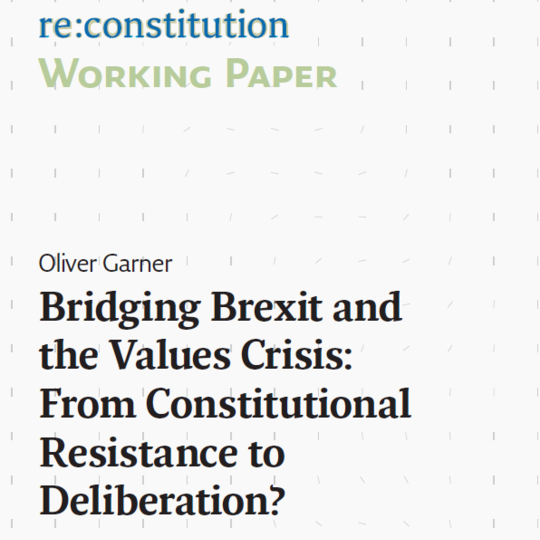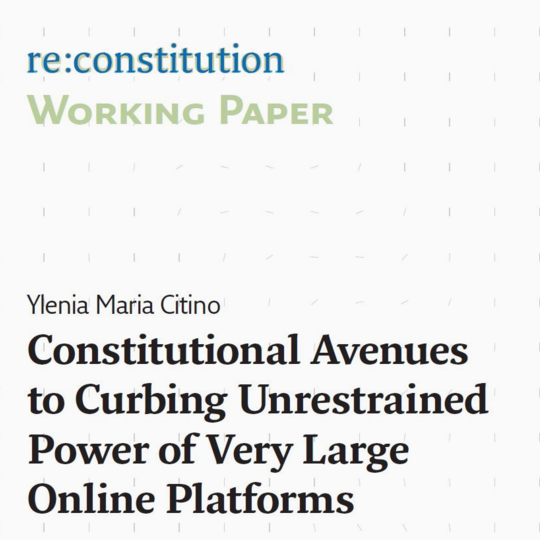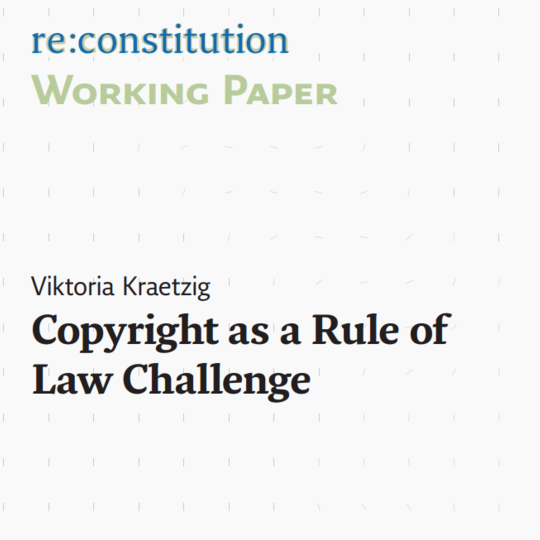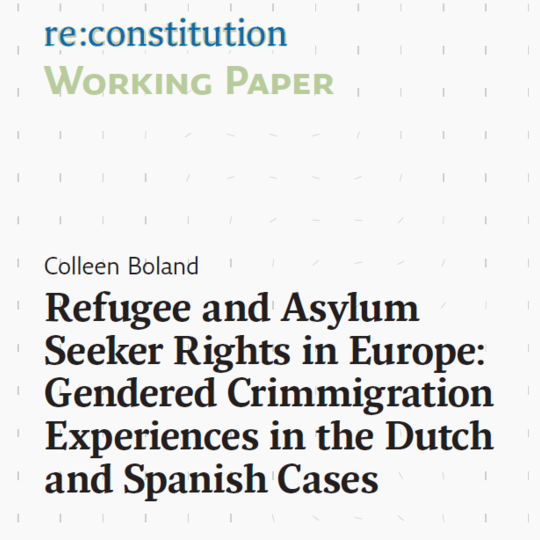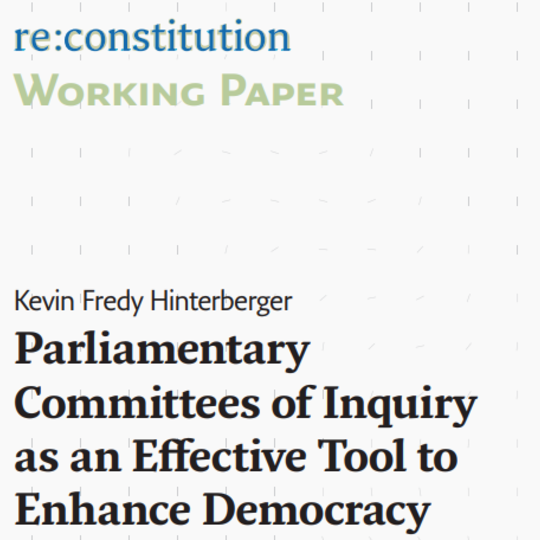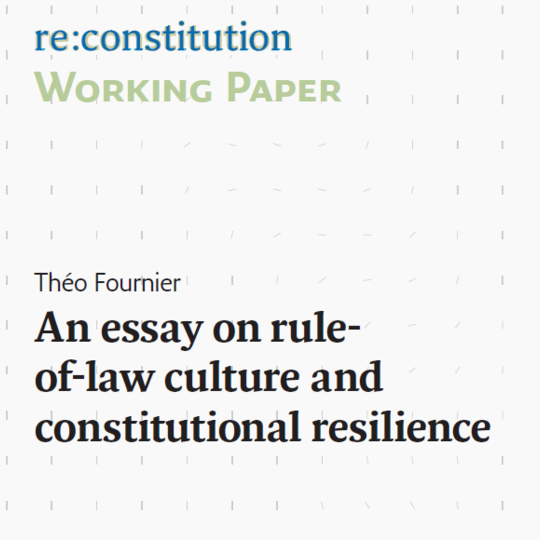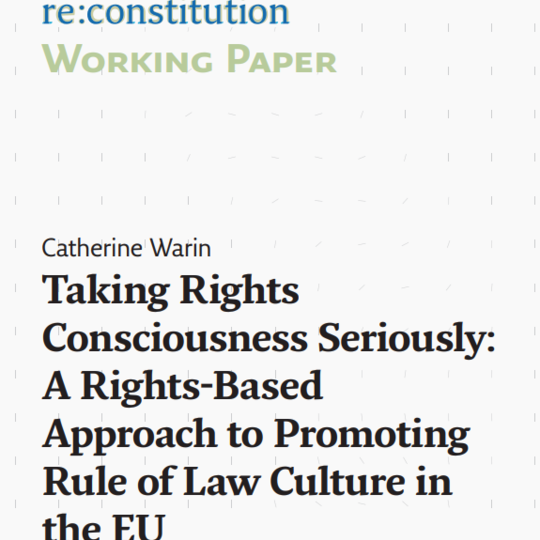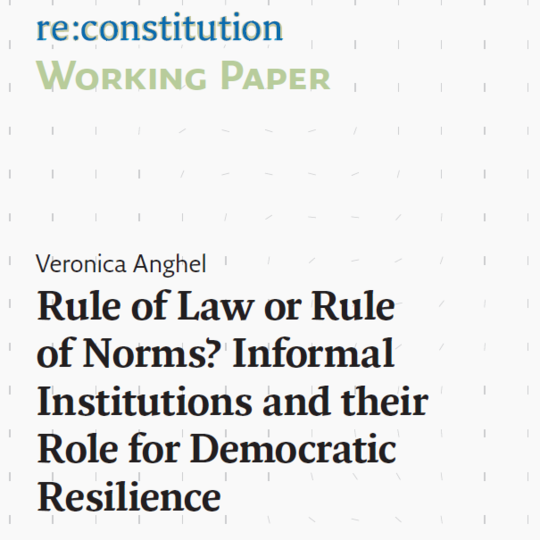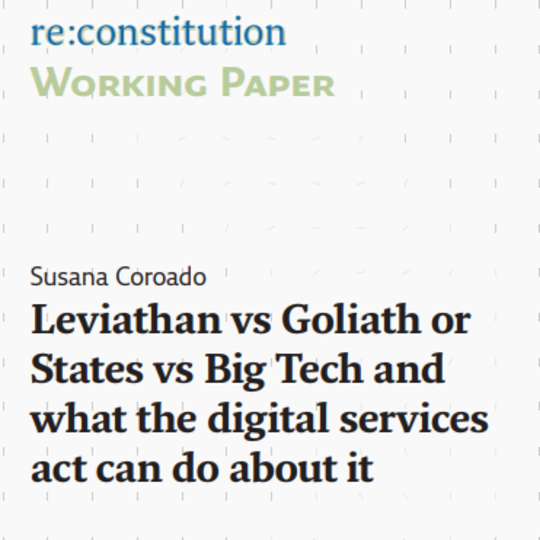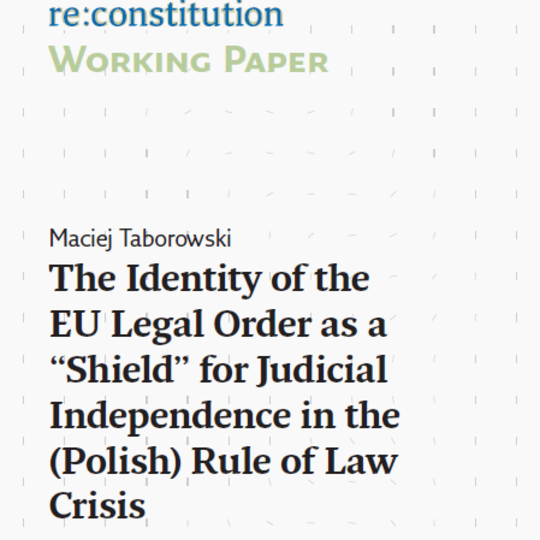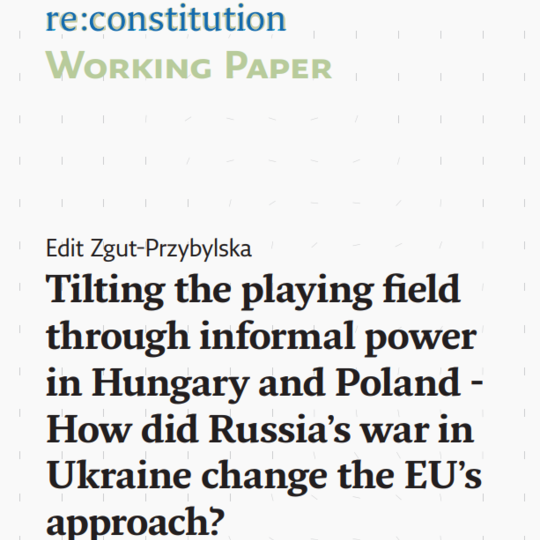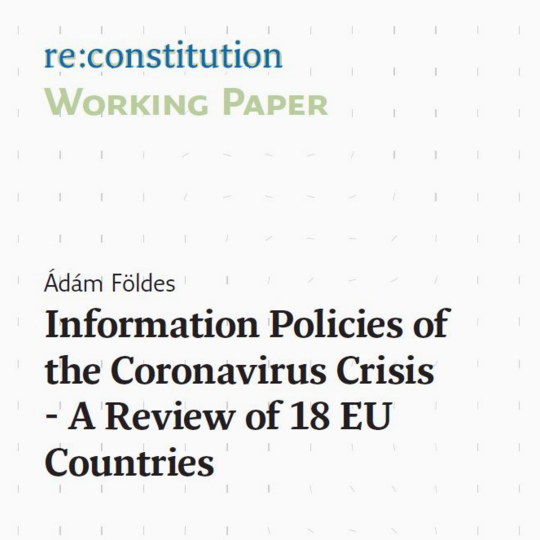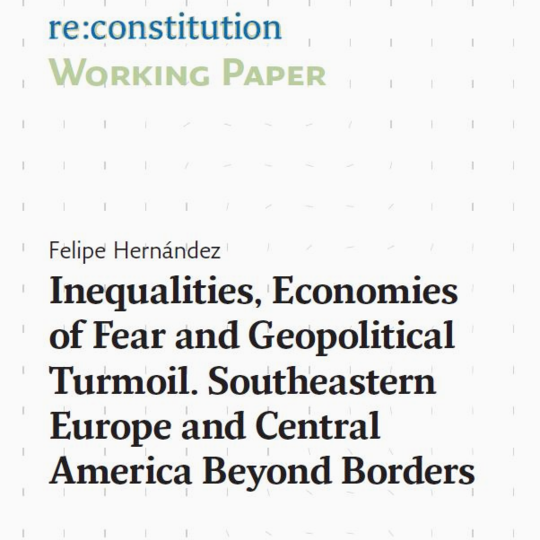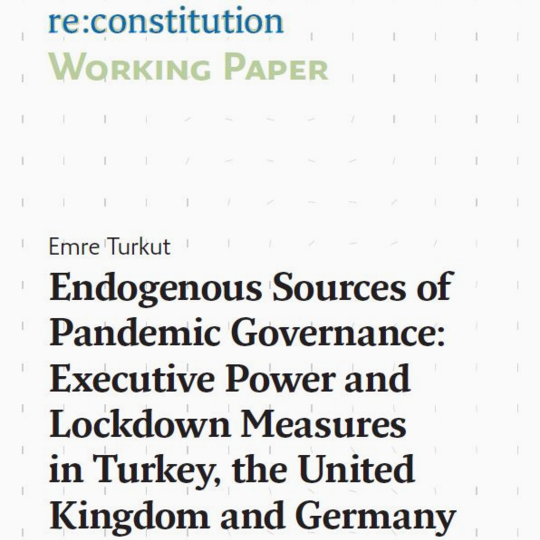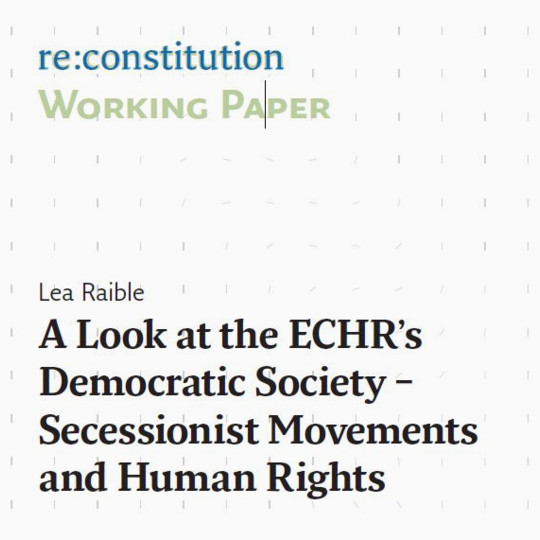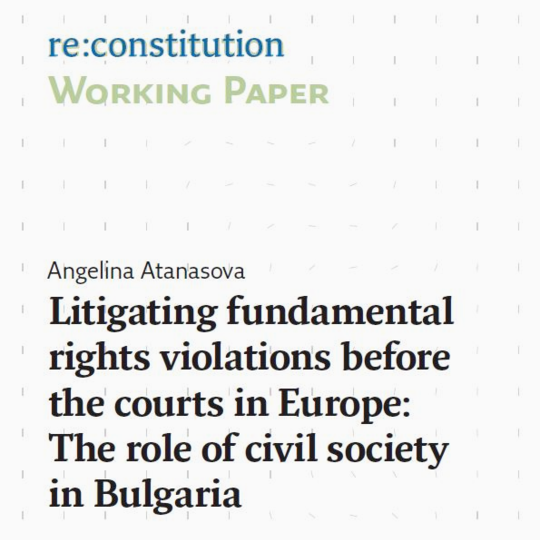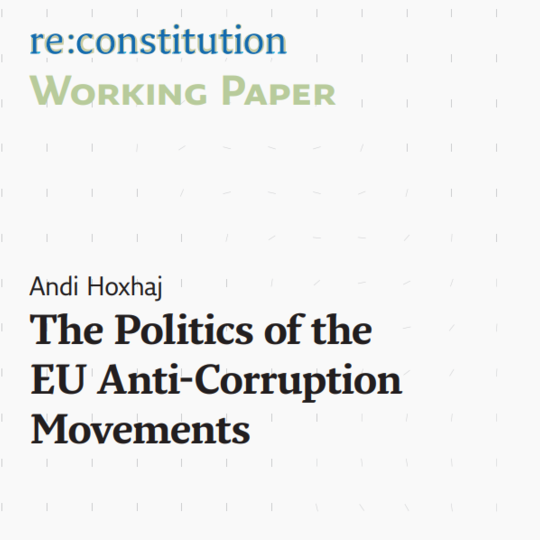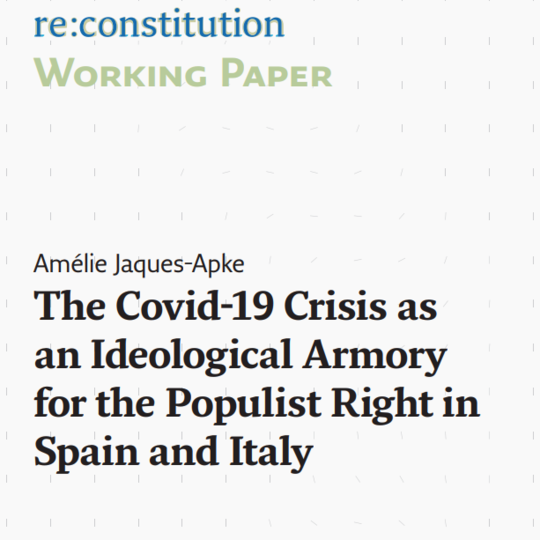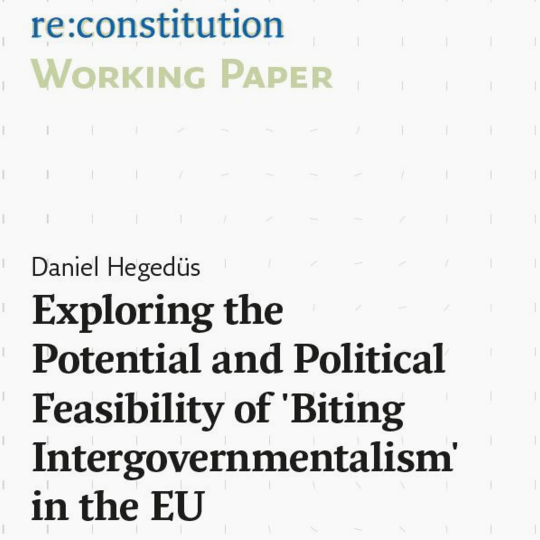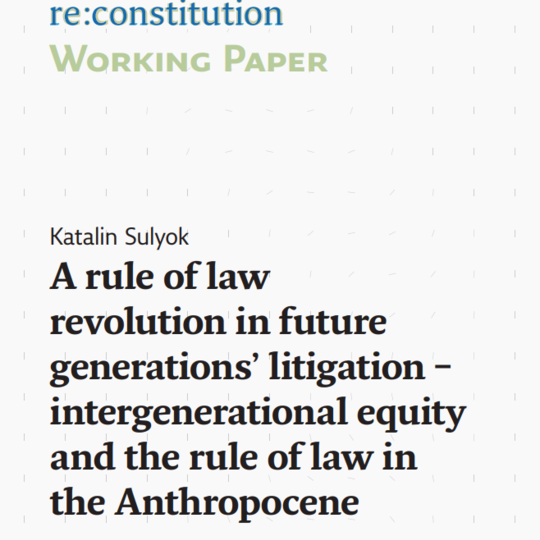Working Papers
Working Papers
The re:constitution Working Paper Series focuses on current controversial questions regarding democracy and the rule of law in Europe and its member states. It will offer room for analysis and discussion of recent problems and developments in this field.
Open Access via perspectivia.net
The series aims to encourage debates and exchange across national borders, as well as disciplines and scholarly or academic boundaries. The re:constitution Working Paper Series shall be an easily accessible forum for the development, publication and exposition of ideas and evaluations on the issues of democracy and the rule of law in Europe, including both contributions from an academic and a more practical perspective. Contributions may range from early stages of an idea to nearly fully developed publications that shall be “tested” before their final publication, e.g. as articles (in newspapers or academic journals), book chapters, or reviews.
Suggested Citation: Panov, Stoyan, “To Derogate (and Notify), or Not to Derogate (and Not to Notify), that is the Question! An Analysis of the Legal Framework of the COVID-19 State of Emergency in the Republic of Bulgaria and ECHR Practice”, re:constitution Working Paper, Forum Transregionale Studien 1/2020, available at reconstitution.eu/workingpapers.html
Working Papers must be sent to reconstitution(at)trafo-berlin.de. Papers may be submitted by re:constitution Fellows and alumni, members of Democracy Reporting International, and the Advisory Board and their (research) staff, and persons who have been approached for contributions. In addition, people who are closely connected to the programme, e.g., scholars and practitioners from partner institutions or participants of re:constitution workshops or conferences may submit papers. Working papers may also be composed of several contributions by different authors (co-authorship), e.g. joint discussion on a current topic or as the result of a re:constitution workshop/conference.
re:constitution Working Papers will generally be published in English. Single contributions should be between 10 and 15 pages long and will ideally not exceed 20 pages. The number of issues of the re:constitution Paper Series will not be limited, and papers may be submitted at any time. There will be no editorial review (peer review). However, re:constitution does not guarantee that all papers submitted will be published.
Authors are requested to consult and respect the German Research Foundation's Guidelines for Safeguarding Good Research Practices. Regarding formatting requirements, please use the re:constitution template for Working Papers and cite according to the style sheet of Forum Transregionale Studien.
The working papers will be published under a Creative Commons License (CC BY-SA 4.0) and uploaded to the re:constitution website as well as to perspectivia.net, the digital open access publication platform of the Max Weber Foundation. Copyright remains with the authors. The publication as re:constitution Working Paper does not preclude subsequent publication elsewhere (magazines, archives, etc). It is the author´s responsibility to control the copyright. As Open Access publications, Working Papers may be copied, used, distributed, transmitted, publicly displayed and used for derivative works in any digital medium and for any responsible purpose, provided that authorship is correctly acknowledged.
Garner, Oliver
Bridging Brexit and the Values Crisis: From Constitutional Resistance to Deliberation?
re:constitution Working Papers, Forum Transregionale Studien, 33/2024
Citino, Ylenia Maria
Constitutional Avenues to Curbing Unrestrained Power of Very Large Online Platforms
re:constitution Working Papers, Forum Transregionale Studien, 32/2024
Kraetzig, Viktoria
Copyright as a Rule of Law Challenge
re:constitution Working Papers, Forum Transregionale Studien, 31/2023
Boland, Colleen
Refugee and Asylum Seeker Rights in Europe : Gendered Crimmigration Experiences in the Dutch and Spanish Cases
re:constitution Working Papers, Forum Transregionale Studien, 30/2023
Hinterberger, Kevin Fredy
Parliamentary Committees of Inquiry as an Effective Tool to Enhance Democracy and Fight Corruption in Austria?
re:constitution Working Papers, Forum Transregionale Studien, 29/2023
Fournier, Théo
An essay on rule of- law culture and constitutional resilience
re:constitution Working Papers, Forum Transregionale Studien, 28/2023
Warin, Catherine
Taking Rights Consciousness Seriously: A Rights-Based Approach to Promoting Rule of Law Culture in the EU
re:constitution Working Paper, Forum Transregionale Studien, 27/2023
Anghel, Veronica
Rule of Law or Rule of Norms? Informal Institutions and their Role for Democratic Resilience
re:constitution Working Paper, Forum Transregionale Studien,, 26/2023
Coroado, Susana
Leviathan vs Goliath or States vs Big Tech and what the digital services act can do about it
re:constitution Working Paper, Forum Transregionale Studien, 25/2023
Taborowski, Maciej
The Identity of the EU Legal Order as a “Shield” for Judicial Independence in the (Polish) Rule of Law Crisis
re:constitution Working Paper, Forum Transregionale Studien, 24/2023
Zgut-Przybylska, Edit
Tilting the playing field through informal power in Hungary and Poland - How did Russia’s war in Ukraine change the EU’s approach?
re:constitution Working Paper, Forum Transregionale Studien, 23/2023
Ádám Földes
Information Policies of the Coronavirus Crisis - A Review of 18 EU Countries
re:constitution Working Paper, Forum Transregionale Studien, 22/2023
Felipe Hernández
Inequalities, Economies of Fear and Geopolitical Turmoil. Southeastern Europe and Central America Beyond Borders
re:constitution Working Paper, Forum Transregionale Studien, 21/2023
Turkut, Emre
Endogenous Sources of Pandemic Governance: Executive Power and Lockdown Measures in Turkey, the United Kingdom and Germany
re:constitution Working Paper, Forum Transregionale Studien, 20/2023
Raible, Lea
A Look at the ECHR’s Democratic Society – Secessionist Movements and Human Rights
re:constitution Working Paper, Forum Transregionale Studien, 19/2023
Atanasova, Angelina
Litigating fundamental rights violations before the courts in Europe: The role of civil society in Bulgaria
re:constitution Working Paper, Forum Transregionale Studien, 18/2023
Hoxhaj, Andi
The Politics of the EU Anti-Corruption Movements
re:constitution Working Paper, Forum Transregionale Studien, 17/2023
Jaques-Apke, Amélie
The Covid-19 Crisis as an Ideological Armory for the Populist Right in Spain and Italy
re:constitution Working Paper, Forum Transregionale Studien, 16/2023
Hegedüs, Daniel
Exploring the Potential and Political Feasibility of 'Biting Intergovernmentalism' in the EU
re:constitution Working Paper, Forum Transregionale Studien, 15/ 2023
Sulyok, Katalin
A rule of law revolution in future generations’ litigation – intergenerational equity and the rule of law in the Anthropocene
re:constitution Working Paper, Forum Transregionale Studien, 14/2023

